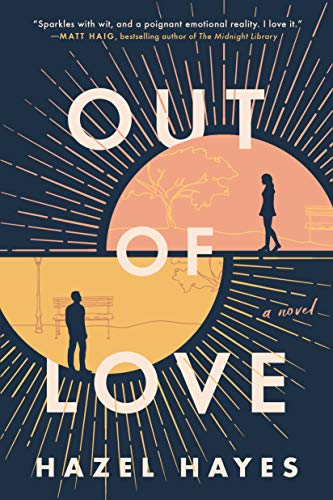Out of Love by Hazel Hayes

Do you ever go to your favorite restaurant and—instead of ordering the dish you know you’ll love because you’ve had it 100 times—order something you wouldn’t normally choose, and then regret it from the first bite?
That’s how Out of Love was for me. I don’t normally read contemporary romance or literary fiction or women’s fiction or whatever this book was. But it was sitting on a table at the front of Barnes & Noble and the concept sounded intriguing and I thought, I should try new things more often.
And then, two months later when I finally finished it, I realized why I continue to return to that comforting dish at my favorite restaurant. Because I like it.
My first thought upon finishing this book: “FINALLY. I’m done.”
Because this book draaaaaaagged.
That’s not to say it wasn’t well written. Hazel Hayes is obviously a talented wordsmith who writes beautifully and who poses questions that most of us can relate to: Whether relationships are worth it. Why you should—or should not—have children. Why people stay in bad, even abusive, relationships. The ebb and flow of happiness and grief and so many other human emotions.
But Out of Love was mind numbingly boring and frustratingly pointless. The vast majority of the narrative is introspective, with no real action. Any action that does take place is slowed down with flashbacks that take the reader out of the story without warning. The narrator—who remains unnamed throughout the entire book and I’m convinced is Hayes herself—will see or think of some random thing and take the reader on a pages-long flashback, sometimes an Inception-style flashback within a flashback, long enough and often enough that it’s easy to forget what the original scene was. There are no cues as to when each section of the book is taking place in relation to the entire relationship’s timeline, which further exacerbates the reader’s confusion.
Because the book starts with the story’s ending, you already know what’s going to happen. It’s right there on the back cover blurb. You know Theo and “Angel” are breaking up, and you know it’s leading to when they met each other. But to what end? What is the point? To depress and frustrate the reader? Why not tell it chronologically, so we can accompany “Angel” on her journey, watch her grow and evolve, and see how she ends up a better, stronger person in spite of everything she’s been through?
I feel a bit bad for giving this book only two stars, because it is so well written. But the book is not a novel—it is a memoir—and calling it a novel draws in the wrong audience. If I’m going to devote the time to reading 400+ pages, there had better be a payoff in the end, and in this case, there just wasn’t one… Unless you count the sweet relief of finally being finished with the book.





